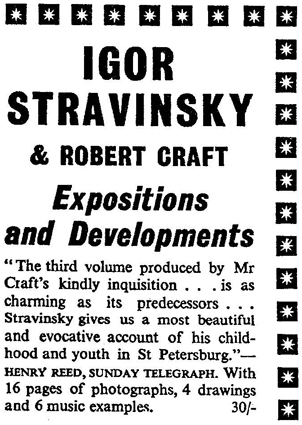
At least twice in the early 1960s, Reed reviewed books for the Sunday Telegraph, and there are probably more. I don't have any sort of access to the Telegraph locally, however, so a dedicated search will probably have to wait for another trip to the Library of Congress.
Here, in the Times (London) on June 7, 1962, we find a Faber & Faber advertisement for Expositions and Developments, one of a series of collaborative conversations between the composer Igor Stravinsky and conductor Robert Craft. The blurb is an excerpt from Reed's Telegraph review:

Then, in an issue of the Bookseller from 1962, an article concerning recent reviews of Georges Simenon's Pedigree, in which Reed duels with both Anthony Burgess and Raymond Mortimer:
A book described in last Sunday's Observer as one of 'almost indigestible richness' seemed to have been digested pretty well by Mr. Henry Reed, writing in the Sunday Telegraph, and not found all that rich, either. Mr. Reed was not too happy about the translation, to start with. He happened to know that the original version of Georges Simenon's Pedigree (Hamish Hamilton) was written in the present tense, and thought that the translator had lost something by putting the English version in the past tense. Mr. Anthony Burgess, who wrote the Observer review, regarded the translation as admirable, as did Mr. Raymond Mortimer in the Sunday Times. But Mr. Reed was also worried about the original; the reader was likely to get helplessly lost, he thought, among the 'phalanxes of aunts and uncles' who drifted in and out of the story. Mr. Burgess thought that the author's characters were convincingly solid and one could walk around them because they filled real space. This reviewer judged the book as a remarkable work of art, and thought that M. Andre Gide's advice to the author to recast an earlier autobiographic version as a novel in the third person was good. Not so for Mr. Reed; for him, M. Gide's advice was 'rather insensitive'. Mr. Mortimer's review of M. Simenon's book was notable for, in the midst of his customary sound appraisal, an anecdote which must not go unrecorded in this paper. The book ended, observed Mr. Mortimer, with the hero at the age of fifteen; he had 'just been sacked from his first job (in a bookseller's) because he knew more than his employer'.
I also have a few intriguing but disappointingly unspecific references to reviews penned by Reed for the Sunday Times. If I can find my notes, I'll have to post something on those. If for no other reason, so I can easily look it up the next time I'm in a library with British newspapers on microfilm, at least until Sundays appear in the online archive for the Times.







